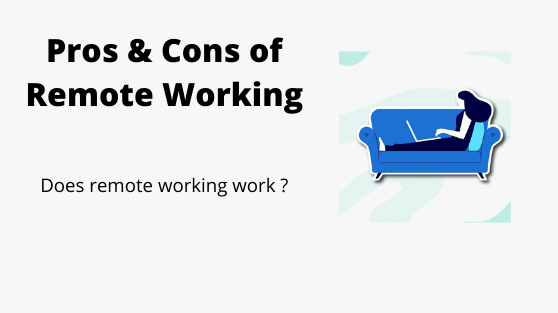Working Remotely Pros and Cons
By Predictive Success |
5.3 min read

Many businesses have recently implemented flexible work from home opportunities for their employees. Working from home allows people to have a better work-life balance, which also benefits the company since workers are happier and dedicated to this set up.
Since organizations were thrust into changing how employees work, enough time has passed to review the advantages and disadvantages of remote work. Even though there can be many advantages to working from home, many people want to return to the workplace.
Pros and Cons of Remote Working
| Pros of Remote Work | Cons of Remote Working |
| 1. Better work-life balance | 1. Zero in person connections |
| 2. Improved productivity | 2. Less collaboration |
| 3. More flexibility | 3. Reduced knowledge from others |
| 4. Increased employee satisfaction | 4. Alienation and lonesomeness |
| 5. Less costs for the business | |
| 6. Attract and keep best workers |
Pros of Remote Work
1. Better work-life balance
People that get to enjoy working from home no longer have to deal with the daily commute. They no longer need to rush to the workplace, get stuck in traffic, or other stresses that can impact arriving on time. Remote workers can now use that extra time to spend with loved ones, to work on a passion project, or just read a book, giving them a better work-life balance. If people are happier and have more time to themselves, they will appreciate their job more, making them dedicated and productive employees.
2. Improved productivity
Remote workers get to enjoy their extra time that they saved by not having to commute to work, which makes them happier overall. The days of feeling angry or stressed before you even arrive at work are behind you, and you can use that time to sleep in, meditate, or exercise which will put you in a better headspace to start your workday.
Employees will focus more on their work with fewer distractions than being in a lively workplace. A recent study found that 90% of remote workers are at least as productive at home than they were at work.
3. More flexibility
Before the switch to remote working, employees were expected to show up to the workplace on time and work for 8 hours before they left. Personal tasks or distractions were frowned upon and there was little to do on lunch hours before returning to their work.
Those that are now working from home have more flexibility in their schedules, and more freedom to work in a relaxed environment. Remote workers can catch up on their work in the early mornings or late evenings now, and can take care of personal tasks during the day if needed. People have the freedom to do their work in whatever way they find most effective, and no longer need to be glued to their computer for 8 hours straight.
4. Increased employee satisfaction
Employees that do remote work are happier overall since they no longer work in stressful or loud environments, and now their co-workers are their friends or family that they live with. When people are in a happier and healthier mental state, their work reflects that, which benefits both employee and business.
5. Less costs for the business
Businesses benefit from having their employees working remotely, as it saves them the cost of new office furniture or equipment. When all employees were working in the office, it may have been hectic and packed, but now businesses are opting for smaller spaces, resulting in lower monthly expenses.
6. Attract and keep best workers
A recent study found that 91% of people prefer working from home, at least most of the time. For those seeking a job, it is likely that they will want to have the option of working from home, which is a major factor for companies seeking new employees. Businesses need to adapt to remote work, otherwise they may face losing employees and will find it more difficult to find top talent if working from home is not an option.
Cons of Remote Working
1. Zero in person connections
One of the downsides of remote work is a loss of in person connections with co-workers and managers. It requires more of an effort to build relationships, since online meetings may not be the most effective for collaboration.
At the same time, employees may find it difficult to grasp details or knowledge since they have no passing encounters with their colleagues and managers. Workers may feel lost or alone without the regular in person connections.
Success tip: Leaders can schedule regular one-on-one meetings with employees to build connections.
2. Less collaboration
With people working from home, the opportunity to chat with other employees on breaks, in the bathroom, or after work no longer exists. These daily interactions may seem insignificant in the workplace, but they contribute to overall connections with employees and the company.
Forcing casual conversations through online meetings does not have the same effect, since people will feel more reserved. This also means that employees are less likely to reach out to co-workers to talk out problems or stresses regarding their work.
Success tip: Host casual meetings where team members can get to know each other in a relaxed space.
3. Reduced knowledge from others
Recent hires will find that working remotely hinders their chances of gaining all the knowledge they need to be confident and successful. Since employees are stuck working on their own and have to figure things out independently, they are more likely to get frustrated or feel left in the dark, which will have a negative impact on their work.
Success tip: Use an online portal where all information relevant to the business can be stored and accessed by employees.
4. Alienation and lonesomeness
Working remotely often means that employees have a less structured schedule. Working in person allows employees from all departments to interact and develop friendships with new people.
The most impactful downside of remote work is the sense of isolation and loneliness it creates since people are by themselves working on a computer day after day. If people are working alone without any social interactions, it can cause harm to their mental health, developing burnouts and declining productivity.
Success tip: Plan virtual team building activities for your entire team.
Is remote work sustainable?
After reviewing the pros and cons of remote working, the positives outweigh the negatives. Developing solutions to the cons of remote work can create happier and productive employees.
Related Blogs
Leading Gen Z: Navigating Tomorrow’s Workplace
Introduction: The workforce landscape is swiftly evolving, and at the forefront of this change is Generation Z. Born into a world of technical advancements, Gen Z brings with them a fresh perspective and a set
Racing Towards Success: Unleashing the Power of Talent in NASCAR Pit Crews
Introduction: In the booming world of NASCAR, where speed is king and split-second decisions make all the difference, there exists a breed of individuals whose grit and determination fuel the engines of victory. They are
Want to Learn What Your Employees Really Think? – Send An Engagement Survey
Conducting employee experience surveys has been a common concept in workplaces for the past decade. The surveys are high-performance HR practices that help boost the overall performance of a business. Companies are now moving forward


